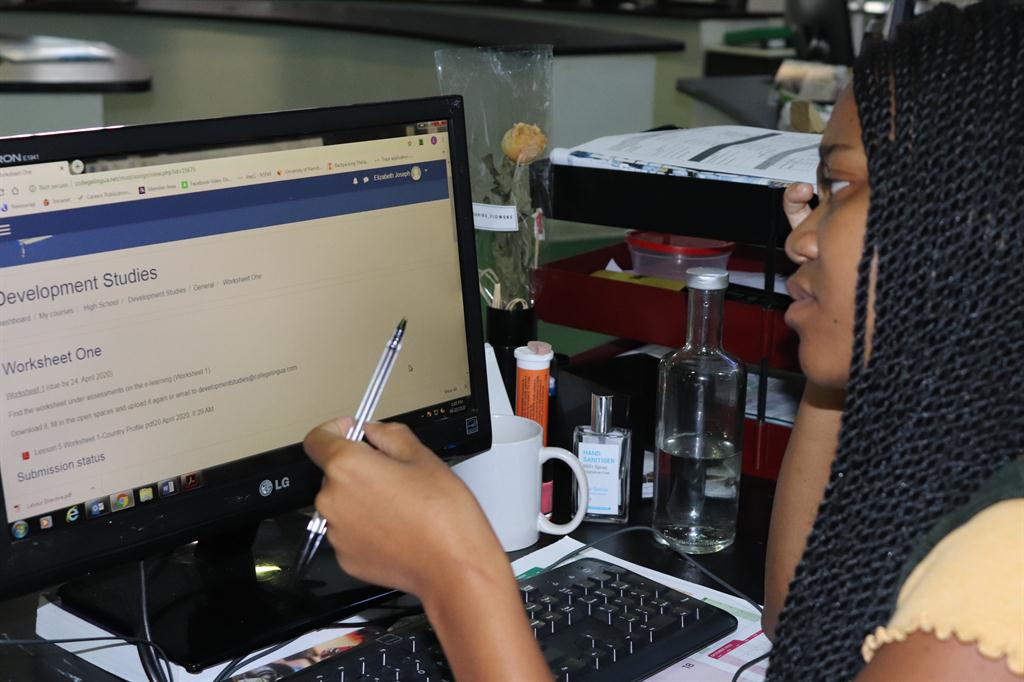Sustaining e-learning after Covid-19
ELIZABETH JOSEPH
WINDHOEK
E-learning systems have become a very important part of teaching, both as web-based systems for online education and as auxiliary tools for face-to-face study, where they provide an additional learning support for on-campus learners.
To ensure the sustainability of an e-learning system on both individual and social levels, the county has to cover many aspects of sustainability requirements such as human, technical, economic and environmental factors.
Namibia National Students Organisation (Nanso) president Simon Taapopi says sustainability can be confirmed only when it is established whether all learners and students have access to this form of learning.
“We call on all educational and ICT stakeholders to immediately develop the necessary infrastructure (educational, living and learning) at the most rural and vulnerable of places.
“This is the only way that e-learning can accommodate different learning styles found in classrooms,” he says.
Community involvement
To be able to sustain this form of education in a post-Covid-19 Namibia, the role of community members as primary educators must be encouraged. Furthermore, Nanso has reached out to the telecommunications sector to gather advice and resources, but stresses that having these resources will be in vain if municipal sectors don't quickly get on board.
“It does not benefit the students and learners having dongles or any other resource at their disposal but they have no electricity at home. We have to come together and see how we can have these two factors work in unison to better each other,” says the chairperson of Nanso's Covid-19 committee, Shaandre Finnies.
Teachers are utilising this form of learning and are making sure that it will be used even when the students and learners return to school.
“We are busy looking for parents' cellphone numbers to create WhatsApp groups to better communicate and in order to mitigate the situation at hand,” says a teacher from Jan Jonker Afrikaner Secondary School..
“Most teachers seem to be locked out of their places of work, which makes it more difficult when it comes to doing lesson planning, creating study materials, etc. “We would welcome this new way of ensuring that teaching and learning is taking place in time of this Covid-19 but also in future.”
Adult education
Taapopi further asked for the intensification of adult education classes in communities, as community members should be able to assist learners.
“Adult education forms a great deal of e-learning and its delivery in informal settlements. We see e-learning as a good and intermediate way of learning; however, its way of marginalising and excluding learners is worrying,” he said.
WINDHOEK
E-learning systems have become a very important part of teaching, both as web-based systems for online education and as auxiliary tools for face-to-face study, where they provide an additional learning support for on-campus learners.
To ensure the sustainability of an e-learning system on both individual and social levels, the county has to cover many aspects of sustainability requirements such as human, technical, economic and environmental factors.
Namibia National Students Organisation (Nanso) president Simon Taapopi says sustainability can be confirmed only when it is established whether all learners and students have access to this form of learning.
“We call on all educational and ICT stakeholders to immediately develop the necessary infrastructure (educational, living and learning) at the most rural and vulnerable of places.
“This is the only way that e-learning can accommodate different learning styles found in classrooms,” he says.
Community involvement
To be able to sustain this form of education in a post-Covid-19 Namibia, the role of community members as primary educators must be encouraged. Furthermore, Nanso has reached out to the telecommunications sector to gather advice and resources, but stresses that having these resources will be in vain if municipal sectors don't quickly get on board.
“It does not benefit the students and learners having dongles or any other resource at their disposal but they have no electricity at home. We have to come together and see how we can have these two factors work in unison to better each other,” says the chairperson of Nanso's Covid-19 committee, Shaandre Finnies.
Teachers are utilising this form of learning and are making sure that it will be used even when the students and learners return to school.
“We are busy looking for parents' cellphone numbers to create WhatsApp groups to better communicate and in order to mitigate the situation at hand,” says a teacher from Jan Jonker Afrikaner Secondary School..
“Most teachers seem to be locked out of their places of work, which makes it more difficult when it comes to doing lesson planning, creating study materials, etc. “We would welcome this new way of ensuring that teaching and learning is taking place in time of this Covid-19 but also in future.”
Adult education
Taapopi further asked for the intensification of adult education classes in communities, as community members should be able to assist learners.
“Adult education forms a great deal of e-learning and its delivery in informal settlements. We see e-learning as a good and intermediate way of learning; however, its way of marginalising and excluding learners is worrying,” he said.




Comments
Namibian Sun
No comments have been left on this article